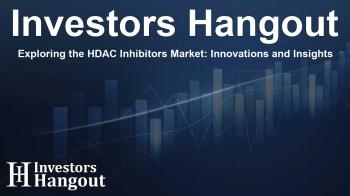Exploring the HDAC Inhibitors Market: Innovations and Insights

Analyzing the Rising HDAC Inhibitors Market
The HDAC (Histone Deacetylase) inhibitor market is experiencing a notable upward trajectory, largely fueled by continuous innovations in cancer therapies. Recent advancements introduce next-generation agents making waves in clinical trials. For instance, Abexinostat, developed by Xynomic Pharmaceuticals, is currently in Phase III for renal cell carcinoma, while Quisinostat from Viriom is progressing through Phase II for uveal melanoma. Partnered by EOC Pharma and Syndax, Entinostat is also under exploration for Hodgkin lymphoma treatment.
Core Insights on the HDAC Inhibitors Market
A new market report reflects significant growth potential for HDAC inhibitors within the 7MM (seven major markets) by 2034. This report accurately investigates treatment modalities, the patient population for significant conditions, encompassing Multiple Myeloma, Peripheral T-cell Lymphoma (PTCL), Cutaneous T-cell Lymphoma (CTCL), and Amyotrophic Lateral Sclerosis (ALS). These conditions were selected based on approved therapies and ongoing pipeline activities.
Highlights from the Market Report
- Forecasts indicate a robust increase in the total market size of HDAC inhibitors across the 7MM by 2034.
- Potential patient numbers across key indications are discussed, including those with Multiple Myeloma and ALS.
- Leading companies within this sector, including Xynomic Pharmaceuticals, Viriom, and Syndax Pharmaceuticals, are focusing on the development of novel HDAC inhibitors set to launch soon.
- Current pipeline candidates like Abexinostat, Quisinostat, and Entinostat are under scrutiny for their efficacy and safety in clinical trials.
The Mechanisms of HDAC Inhibitors
Histone deacetylases (HDACs) are vital enzymes that remove acetyl groups from proteins. Their inhibition results in the alteration of gene expression linked to cancer progression. The multitude of pathways influenced by HDACs highlights their potential as effective cancer treatment modalities. HDAC inhibitors are recognized for their diverse biological effects, including influencing apoptotic pathways, cell cycle regulation, and angiogenesis.
Epidemiology of HDAC Inhibitors
The report offers an in-depth epidemiological analysis covering various segments from 2020 to 2034 in the 7MM, detailing the total number of cases and the pool of eligible patients for HDAC inhibitors. This segmentation amplifies the understanding of the disease burden and helps in strategic planning for treatment advances.
Products on the Market and Emerging Innovations
Currently, several HDAC inhibitors are available on the market. Notable entries include DUVYZAT (givinostat), which has gained attention as a treatment for Duchenne muscular dystrophy (DMD) in children. Its specific action remains somewhat elusive, making ongoing evaluations critical. As of mid-2025, DUVYZAT has garnered positive feedback from regulatory bodies, marking a significant milestone in its availability.
HDAC Inhibitor Developments
HIYASTA (HBI-8000) stands out as an epigenetic immunomodulator, gaining approval for various indications, including T-cell non-Hodgkin's lymphoma. Notably, a multinational Phase III trial is currently assessing HIYASTA in combination therapies, showcasing the multidimensional approach in its potential applications. Meanwhile, Xynomic Pharmaceuticals continues to drive advancements with Abexinostat, cementing its pivotal role in the competitive landscape.
Market Challenges and Future Directions
Despite the promising outlook for the HDAC inhibitors market, challenges linger. Many products pose toxicity risks that can deter broader acceptance among healthcare providers and patients. Additionally, the presence of competitive therapies in the market introduces further hurdles. Nevertheless, the potential for success exists, particularly if ongoing research aligns with precision medicine trends and advancements in biomarker identification can improve patient targeting.
The Need for Innovative Research
As the market for HDAC inhibitors progresses, it is essential for ongoing research to address safety concerns and to explore combination therapies. These strategies could enhance efficacy while mitigating adverse effects, allowing HDAC inhibitors to secure their place within the broader oncology treatment landscape.
Frequently Asked Questions
What are HDAC inhibitors?
HDAC inhibitors are drugs that block histone deacetylase enzymes, which impact gene expression and are utilized primarily in cancer treatments.
What is the current market outlook for HDAC inhibitors?
The market for HDAC inhibitors is projected to grow significantly in the coming years due to increased demand for targeted cancer therapies.
Which cancers are being targeted by HDAC inhibitors?
HDAC inhibitors are primarily focused on treating hematologic cancers such as Multiple Myeloma and T-cell lymphomas, among others.
Who are the key players in the HDAC inhibitors market?
Notable companies include Xynomic Pharmaceuticals, Viriom, Syndax Pharmaceuticals, and Jubilant Therapeutics, among others.
What challenges exist in the HDAC inhibitors market?
Challenges include toxicity concerns, competition from other therapies, and the need for safety improvements in current formulations.
About The Author
Contact Hannah Lewis privately here. Or send an email with ATTN: Hannah Lewis as the subject to contact@investorshangout.com.
About Investors Hangout
Investors Hangout is a leading online stock forum for financial discussion and learning, offering a wide range of free tools and resources. It draws in traders of all levels, who exchange market knowledge, investigate trading tactics, and keep an eye on industry developments in real time. Featuring financial articles, stock message boards, quotes, charts, company profiles, and live news updates. Through cooperative learning and a wealth of informational resources, it helps users from novices creating their first portfolios to experts honing their techniques. Join Investors Hangout today: https://investorshangout.com/
The content of this article is based on factual, publicly available information and does not represent legal, financial, or investment advice. Investors Hangout does not offer financial advice, and the author is not a licensed financial advisor. Consult a qualified advisor before making any financial or investment decisions based on this article. This article should not be considered advice to purchase, sell, or hold any securities or other investments. If any of the material provided here is inaccurate, please contact us for corrections.

